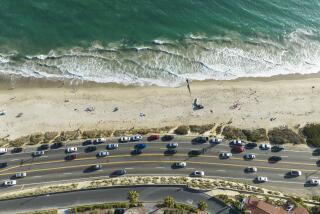Bolsa Chica Beach Closure Bums Out Surfers, the State
- Share via
HUNTINGTON BEACH — It’s a ritual that surfer Scott Swanson has down pat. He wakes up, sips his morning coffee, jumps in his car and heads for Tube City, his favorite beach break at Bolsa Chica State Beach.
But since the discovery of sewage bacteria in the ocean off the popular surfing beach prompted its closure, Swanson, 29, of Laguna Niguel, and hundreds of other surfers have had to go elsewhere.
No big deal if you don’t surf, right? You simply find another sandy stretch to spread a blanket. For people like Swanson, though, surfing is not just a sport, it’s a lifestyle. And the beach closure is more than an inconvenience. It’s a major disruption.
“This is the place where I get to see and meet my friend Mike. It’s our meeting place and having him call me to go surfing gets me out of bed and up here surfing,” Swanson said Tuesday.
Swanson and his friend Mike Darr, 29, of Long Beach said they favor Bolsa Chica because they can park close to the water’s edge and shower after getting out of the water before going to work.
Stephane Vimont, 35, of Long Beach said he bought a yearly pass for $75 to park at Bolsa Chica because he likes the waves there. But on Tuesday, he learned that finding a substitute beach can be expensive.
“I got a parking ticket, and it’s for $36!” Vimont angrily declared when he found the ticket on his windshield, courtesy of the Huntington Beach Police Department.
He wasn’t the only surfer dealing with beach angst.
Katy Roper, 18, of Huntington Beach said she just finished her first year at Humboldt State University and was looking forward to some Southern California beach camaraderie with her surf mates at Bolsa Chica.
Instead, she couldn’t find any of the old gang at lifeguard tower 16. Worse, not only could she not use her state parking pass, she didn’t have any quarters for the parking meters down the beach from Bolsa Chica. One quarter lets you park only 10 minutes.
“It sucks basically,” Roper said. “That’s what I think about the whole thing.”
Roper’s friend Biz Bettis, 25, a Bolsa Chica regular, said she misses seeing her extended “beach family” at their favorite spot.
“Bolsa Chica is convenient because it breaks good there, and it’s a big family down there. Now, we have to go to Magnolia [Street] to surf” about five miles away.
State beach officials hope by next week to decide on a way to fix the sewage problem at Bolsa Chica. How long it will take to implement a plan hasn’t been determined. Until then, the prohibition on swimming and surfing will remain indefinitely.
The closure, ordered last Thursday by the Orange County Health Care Agency, followed the discovery of dozens of cracks in a 2.5-mile sewer line serving the state beach’s 14 restrooms.
Officials think small amounts of liquid raw sewage are seeping from the pipe underground through the sand and into the ocean.
“To fully protect the public, we had to close the beach,” said Larry Honeybourne, water quality chief at the county’s Health Care Agency Environmental Health Division.
Although health officials are concerned, they do not believe the leak poses a risk.
The timing of the discovery is sensitive for Bolsa Chica, which is approaching the three-day Fourth of July weekend that traditionally produces the beach’s biggest crowds and its biggest gate receipts.
Bolsa Chica reported 885,186 visitors in 1995 and an annual revenue of $1.05 million. Nearly a third of that revenue is generated in the summer.
“I’d like to see that park open in the next two weeks,” said Jack Roggenbuck, in charge of state parks and beaches in Orange County.
State officials are examining methods of addressing the sewer problem, Roggenbuck said. They include replacing the pipeline for about $1.4 million, building a temporary aboveground bypass for $75,000, or bringing in chemical toilets at a cost of $150,000.
Increased chlorination, which is now being done, is the most economical temporary solution at $50,000, Roggenbuck said.
More to Read
Sign up for Essential California
The most important California stories and recommendations in your inbox every morning.
You may occasionally receive promotional content from the Los Angeles Times.










